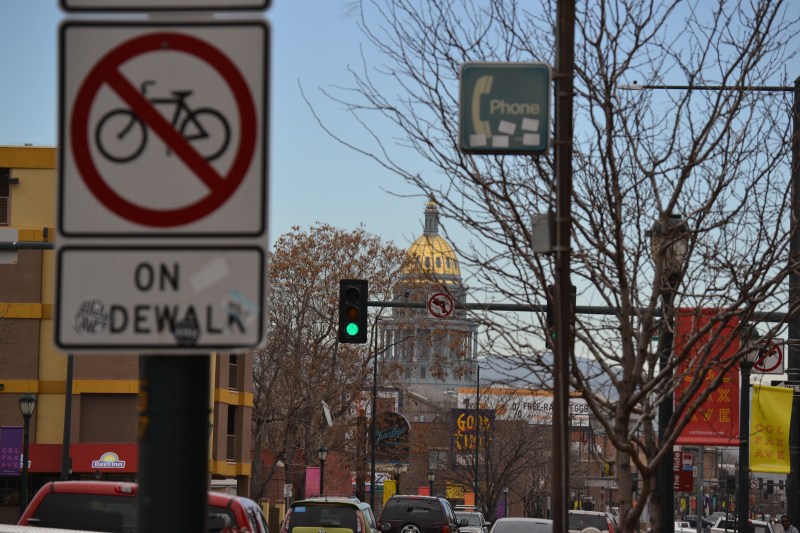5 Story Lines to Watch in the 2018 Colorado General Assembly Session

When it comes to transportation, nothing’s a gimme at the capitol, with Republicans in control of the Senate and Democrats in control of the House. But there’s a lot at stake.
State lawmakers kicked off the 2018 legislative session last week. Here’s our guide to the major transportation issues that the legislature is expected to deal with.
Will transit, biking, and walking get funded?
SB1, a Republican-favored bill, would bond against regular state revenue to raise up to $3.5 billion — mostly for road construction and maintenance. In its current form, the bill would fund the Colorado Department of Transportation’s biggest projects. Only about 16 percent of those projects would improve transit, biking, and walking, according to a draft list [PDF].
If SB1 passes, it could sap momentum from a better funding plan that may get on the November ballot.
The Denver Metro Chamber of Commerce plans to pitch new transportation revenue to voters this year, after the legislature balked at a transportation tax hike in 2017. As of last week, when the Chamber held a meeting of potential coalition members, the details of the ballot measure have yet to be determined. Reps from the Colorado Contractors Association, RTD, local municipalities, and the Denver Regional Council of Governments were just a few of the several dozen interested organizations in the room.
While the specifics of the ballot measure aren’t available yet, it would probably give local governments more say over transportation spending than SB1, which leaves everything up to CDOT. Local agencies are more likely to invest in transit, biking, and walking infrastructure than CDOT, but if SB1 passes first, voters might have less of an appetite to enact another transportation spending measure.
Humphrey, Neville want to let more drivers speed and run red lights
Senator Tim Neville and Representative Stephen Humphrey are sponsoring HB 1072, which would outlaw automated traffic enforcement, including cameras that catch speeders and red light runners.

This technology saves lives. In Colorado, we need more speeding enforcement, not less. In 2017, for the sixth straight year, traffic fatalities rose statewide, with 620 people losing their lives. Yet making speeding and running red lights easier are two big priorities for these lawmakers in 2018.
A tougher distracted driving bill
Right now Colorado has a ban on mobile phone calls while driving — but it only applies to people under 18.
Senator Lois Court and Representative Jovan Melton introduced SB 49, which would extend the ban to everyone and include all mobile electronic devices, not just wireless telephones. Adults would still be allowed to use a hands-free device, however.
The bill as currently written would also fix a loophole that sort of legalized texting and driving last year. The law currently says officers have to witness a person texting and driving recklessly to enforce Colorado’s texting ban. SB 49 would make the law enforceable even if careless driving is not obvious.
Will Republicans continue to hold RTD funding hostage?
RTD lost a $6 million annual boost to its budget thanks to a typo in a bill meant to give marijuana revenue to special districts last year. Rather than restore funding to RTD (and rural hospitals) during a special session, Republicans refused to budge on a common sense fix.
No one has introduced a bill to address the error in the regular session yet.
Will RTD get funding for a low-income fare pass?
Before the official session began, a bipartisan committee of lawmakers considered a bill that would raise about $10 million annually from big retailers like Walmart to subsidize fare passes for low-income residents in metro Denver. They didn’t support it.
But Senator Lois Court said legislators would intervene if RTD doesn’t come up with a way to pay for low-income transit fare discounts in its pass program working group, which will make recommendations in March.


